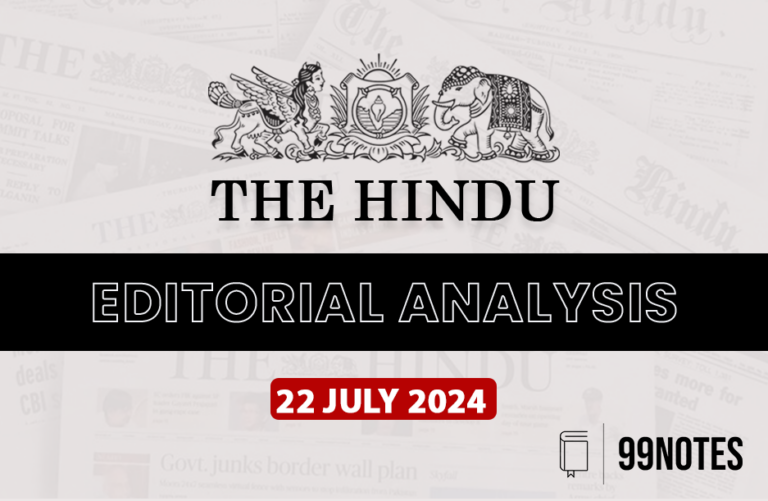20 June 2023 : The Hindu Editorial
The Hindu Editorial
20-June-2023
Daily Current Affairs For UPSC ,The Hindu Editorial Summary
1. Refugees as assets to their new countries.
Topic: GS2 – International relations.
Context:
-
-
-
World Refugee Day (June 20) commemorates the courage and resilience of 103 million individuals who have experienced forced displacement due to conflicts worldwide.
-
The day highlights the collective responsibility of global citizens and promotes engagement, empathy, and solidarity with refugees and displaced persons.
-
Ongoing conflicts in Ukraine, Myanmar, Sudan, Afghanistan, Somalia, and other regions pose significant challenges.
-
-
Barriers to Refugees:
-
-
-
Refugees and asylum seekers face obstacles in obtaining legal recognition and government-issued documents, hindering their access to essential services.
-
Efforts must be made to dismantle these barriers and ensure equal opportunities for refugees in employment, education, housing, and healthcare.
-
Inclusive societies should cater to the unique needs of refugee youth and engage them in achieving the Sustainable Development Agenda.
-
The Global Compact on Refugees calls for solidarity and a whole-of-society approach to address the displacement crisis.
-
It recognizes the responsibility of individuals, private sector, NGOs, and community-based organizations in supporting the forcibly displaced.
-
The Global Compact aims to enhance the international response, support host countries, promote self-reliance, and explore long-term solutions.
-
Equitable burden-sharing and support for refugees and host communities are essential to realizing their well-being.
-
By embracing these principles, the potential of refugees can be realized, and hope and opportunities can be provided to those in need.
-
The Government of India’s vision of ‘Viksit Yuva Viksit Bharat’ can be achieved by supporting youth from refugee and host communities.
-
-
Status of refugees in India:
-
-
-
According to the UNHCR (United Nations High Commissioner for Refugees), India hosted over 200,000 refugees and asylum-seekers as of the end of 2020.
-
The majority of refugees in India come from countries such as Afghanistan, Bangladesh, Myanmar and other neighbouring countries.
-
-
Issues with refugee influx in India:
The acceptance of refugees can be a complex and multifaceted issue. Some of the problems associated with refugee acceptance include:
-
-
-
Capacity and Resources: Providing support and services to refugees requires significant resources, including housing, healthcare, education, and social welfare. Insufficient capacity and limited resources can strain existing systems and create challenges in accommodating and integrating refugees effectively.
-
Social and Cultural Differences: Refugees may come from diverse cultural backgrounds and have different languages, traditions, and religious practices. This can create challenges in terms of social integration, cultural adaptation, and fostering mutual understanding between refugees and host communities.
-
Economic Impact: There can be concerns about the potential economic impact of accepting refugees. Some argue that refugees may compete with local populations for jobs and resources.
-
Security Concerns: Security considerations play a role in the acceptance of refugees, especially in the context of conflicts and the potential infiltration of extremist elements. Striking a balance between security measures and humanitarian obligations is often a challenge.
-
Strain on Local Infrastructure: A sudden influx of refugees can strain local infrastructure, including housing, healthcare facilities, schools, and public services. This can create pressure on the host community and lead to tensions and resentment.
-
-
In this context, it is being argued that a dedicated national refugee policy is a must for India.
Need for India to have dedicated refugee policy:
-
-
-
Legal Framework: Having a dedicated refugee policy would establish a clear legal framework for the treatment and protection of refugees in India. It would outline the rights and responsibilities of both refugees and the government, ensuring that their rights to safety, security, and dignity are upheld.
-
Protection and Humanitarian Response: A refugee policy would enable India to provide a systematic and coordinated response to the protection and humanitarian needs of refugees.
-
Clarity and Consistency: A well-defined refugee policy would bring clarity and consistency to the process of refugee acceptance and resettlement. It would establish clear guidelines and criteria for determining refugee status, ensuring that decisions are made transparently and uniformly.
-
International Obligations: Having a dedicated refugee policy would demonstrate India’s commitment to fulfilling its international obligations and upholding the principles of refugee protection.
-
Improved Integration: A refugee policy would facilitate the integration of refugees into Indian society. It could include provisions for language training, skill development programs, and support for cultural adaptation, promoting the social and economic inclusion of refugees and their contribution to the host community.
-
Collaboration and Partnership: A dedicated policy would enable India to collaborate and partner with international organizations, non-governmental organizations, and other stakeholders working in the field of refugee protection.
-
-
Conclusion:
On World Refugee Day, it is crucial to stand together with refugees, recognize their strength and potential, and work towards dismantling barriers and restoring their dignity.
Source: https://www.thehindu.com/opinion/op-ed/refugees-as-assets-to-their-new-countries/article66986944.ece
2. Safety first: on Indian pharma products and drug safety.
Topic: GS3 – Pharmaceutical industry.
Context:
-
-
-
Reports have emerged of drugs manufactured in India causing severe harm and deaths in patients worldwide.
-
Recent incidents include the deaths of two patients in Sri Lanka who were administered Indian-made anaesthetic drugs and eye drops manufactured in India causing infections, blindness, and deaths in Sri Lanka and the United States.
-
-
More about the news:
-
-
-
The World Health Organization (WHO) linked the deaths of 70 children in Gambia to cough syrups containing deadly chemicals used as a substitute for propylene glycol. Similar incidents occurred in Uzbekistan and the Marshall Islands.
-
The Indian drug regulator has been criticized for giving a clean chit to the company involved in the Gambia incident and for its lack of proactive measures to ensure drug safety.
-
The regulator’s conduct has raised concerns about its role as a watchdog for drug safety and its perceived alignment with the pharmaceutical industry.
-
To maintain its position as the pharmacy of the global south, India needs a drug regulator that prioritizes drug safety and acts as a vigilant overseer rather than a facilitator for the pharmaceutical industry.
-
-
Issues with drug regulation in India:
-
-
-
Lack of stringent regulatory enforcement: There have been concerns about the lack of strict enforcement and monitoring of drug regulations in India. This has led to instances of substandard and counterfeit drugs entering the market.
-
Quality control challenges: The Indian drug regulatory system faces challenges in ensuring consistent quality control across the entire pharmaceutical manufacturing process. There have been cases of drugs being manufactured in unregulated facilities or with inadequate quality control measures.
-
Regulatory gaps: Some critics argue that the regulatory framework in India has gaps that allow for loopholes and non-compliance. These gaps can be exploited by unscrupulous manufacturers and result in the production and distribution of unsafe or substandard drugs.
-
Limited resources: The regulatory authorities in India often face resource constraints, including insufficient staffing and infrastructure, which can impact their ability to effectively monitor and regulate the pharmaceutical industry.
-
Corruption and unethical practices: Instances of corruption and unethical practices within the drug regulatory system have been reported. These can undermine the integrity of the regulatory process and compromise patient safety.
-
Lack of transparency: Transparency in the drug regulatory process, including the disclosure of clinical trial data and regulatory decisions, has been a concern. Greater transparency is crucial to building trust and ensuring accountability.
-
Lack of compliance to International standards: India has faced criticism for not always aligning with international compliance standards, which can impact the acceptance and credibility of Indian-manufactured drugs in the global market.
-
-
Way Forward:
-
-
-
Strengthen regulatory enforcement: This includes increasing the number of inspectors, improving laboratory facilities, and conducting regular inspections of manufacturing facilities.
-
Enhance quality control measures: Implement stringent quality control measures throughout the pharmaceutical manufacturing process, including robust testing and monitoring of raw materials, production processes, and finished products.
-
Promote transparency and accountability: Establish mechanisms for greater transparency in the drug regulatory process, including disclosure of clinical trial data, regulatory decisions, and inspections. Encourage public access to information regarding drug safety, adverse events, and regulatory actions.
-
Strengthen international collaboration: Collaborate with international regulatory agencies and organizations to adopt best practices and align with international standards.
-
Promote research and innovation: Invest in research and development to advance drug discovery, development, and manufacturing processes. Encourage innovation in areas such as quality control technologies, supply chain management, and pharmacovigilance systems.
-
Public awareness and education: Increase public awareness about the importance of quality medicines, drug safety, and the role of regulatory agencies. Conduct educational campaigns to empower patients and healthcare professionals to report adverse drug reactions and counterfeit drugs.
-
Strengthen legal and regulatory framework: Review and update existing laws and regulations related to drug regulation to address emerging challenges and ensure their effectiveness. Enact stricter penalties for non-compliance and enforce regulatory provisions effectively.
-
Continuous monitoring and evaluation: Establish a system for continuous monitoring and evaluation of the drug regulatory process to identify areas for improvement and ensure the effectiveness of implemented measures. Regularly review and update regulatory policies and guidelines to keep pace with scientific advancements and changing global standards.
-
-
Conclusion:
By implementing these measures, India can enhance drug regulation, ensure the production and distribution of safe and quality drugs, and strengthen its position as a reliable provider of medicines both domestically and globally.
3. A summit with substance.
Topic: GS3 – Climate change and Financing
Context:
-
-
-
The Summit for a New Global Financing Pact in Paris aims to increase financial solidarity with the Global South and address the cost of climate change and sustainable development.
-
-
Climate change and Financial Challenges:
-
-
-
The scale of investment needed to meet global objectives is around $4 trillion per year, but official development assistance falls short at $204 billion.
-
International funding is unpredictable, poorly structured, and fails to address liquidity challenges in developing countries.
-
The summit should focus on creating a pact for global finance flows, both domestically and internationally, by modernizing tax structures, curbing illicit financial flows, and proportionately taxing emission-intensive global flows.
-
A global platform is needed to de-risk finance and mobilize private investment in sustainable infrastructure, utilizing blended finance and mechanisms to lower costs and mitigate risks.
-
A political pathway should be charted to establish time-bound deliverables on climate finance, outlining the mathematics and mechanisms of finance and creating momentum for real investment over the next two years.
-
The goal should be to reform finance for sustainable development and promote meaningful multilateralism that addresses the needs and priorities of the Global South.
-
-
Issues with global climate financing:
-
-
-
Inequity: The majority of climate finance flows from developed to developing countries, but the distribution of these flows is not equitable. Developed countries have historically contributed the most to climate change, and they have the financial resources to invest in mitigation and adaptation. However, developing countries are the most vulnerable to the impacts of climate change, and they need more financial support to adapt to these impacts.
-
Inefficiency: The current system of global climate financing is inefficient. There is a lack of coordination between different donors, and there is a lack of transparency in how funds are used. This can lead to duplication of efforts and a waste of resources.
-
Uncertainty: The future of global climate financing is uncertain. The Paris Agreement has set ambitious goals for climate action, but it is not clear how these goals will be funded. There is also a risk that developed countries will not meet their commitments to provide climate finance.
-
-
Despite these challenges, there are a number of things that can be done to improve global climate financing. These include:
-
-
-
Increased ambition: Developed countries need to increase their ambition to provide climate finance. They need to commit to providing more financial resources to developing countries, and they should do so in a more equitable way.
-
Improved coordination: There needs to be more coordination between different donors. This will help to avoid duplication of efforts and to ensure that funds are used efficiently.
-
Increased transparency: There needs to be more transparency in how funds are used. This will help to ensure that funds are used effectively and that they are reaching the people who need them most.
-
-
Conclusion:
Global climate financing is a critical issue. It is essential that we find ways to improve the current system and to ensure that developing countries have the financial resources they need to mitigate and adapt to climate change.
Source: https://www.thehindu.com/opinion/op-ed/a-summit-with-substance/article66986234.ece
For Enquiry

20 June 2023 : The Hindu Editorial

20 June 2023 : Daily Current Affairs

19 June 2023 : Indian Express

19 June 2023 : Daily Quiz

19 June 2023 : PIB

19 June 2023 : The Hindu Editorial

19 June 2023 : Daily Current Affairs

Kurukshetra Summary, May 2023

17 June 2023 : Indian Express

17 June 2023 : Daily Quiz
The Hindu 20 June 2023 : The Hindu Editorial The Hindu Editorial
19-June-2023
Daily Current Affairs For UPSC ,The Hindu Editorial Summary
Facebook-f
Twitter
Youtube
1….
Daily Current Affairs 20 June 2023 : Daily Current Affairs DAILY CURRENT AFFAIRS
20-June-2023
Daily Current Affairs For UPSC ,Daily Current affairs of The hIndu…
Indian Express 19 June 2023 : Indian Express Indian Express
19-June-2023
The Indian Express, CSE candidates can stay informed about current events…
Daily Quiz 19 June 2023 : Daily Quiz 19 June 2023 : Daily Quiz…
PIB 19 June 2023 : PIB PRESS INFORMATION BUREAU
19-June-2023
Daily Current Affairs For UPSC ,The PIB ( Press Information Bureau…
The Hindu 19 June 2023 : The Hindu Editorial The Hindu Editorial
19-June-2023
Daily Current Affairs For UPSC ,The Hindu Editorial Summary
Facebook-f
Twitter
Youtube
1….
Daily Current Affairs 19 June 2023 : Daily Current Affairs DAILY CURRENT AFFAIRS
19-June-2023
Daily Current Affairs For UPSC ,Daily Current affairs of The hIndu…
kurukshetra summary Kurukshetra Summary, May 2023 Chapter 1: Potential of the Rural Crafts
Introduction
India has an affluent tradition of rural crafts…
Indian Express 17 June 2023 : Indian Express Indian Express
17-June-2023
The Indian Express, CSE candidates can stay informed about current events…
Daily Quiz 17 June 2023 : Daily Quiz 17 june 2023 : Daily Quiz…




